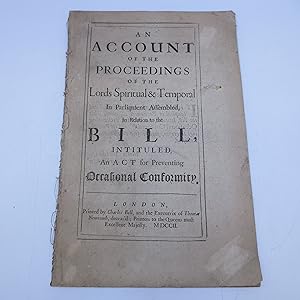BY AUTHOR HOUSE OF ENGLAND & WALES PARLIAMENT (1 résultats)
Type d'article
- Tous les types d'articles
- Livres (1)
- Magazines & Périodiques
- Bandes dessinées
- Partitions de musique
- Art, Affiches et Gravures
- Photographies
- Cartes
-
Manuscrits &
Papiers anciens
Etat
- Tous
- Neuf
- Ancien ou d'occasion
Reliure
- Toutes
- Couverture rigide
- Couverture souple
Particularités
- Edition originale
- Signé
- Jaquette
- Avec images
- Sans impression à la demande
Pays
Evaluation du vendeur
-
An Account of the Proceedings of the Lords Spiritual & Temporal In Parliament Assembled, In Relation to the Bill, Intituled, An ACT for Preventing Occasional Conformity. (FIRST EDITION)
Edité par Printed by Charles Bill, and the Executrix of Thomas Newcomb, deceas'd; Printers to the Queen's most Excellent Majesty, 1702
Vendeur : Shelley and Son Books (IOBA), Hendersonville, NC, Etats-Unis
Membre d'association : IOBA
Edition originale
Pamphlet. Etat : Very Good. First Edition. FIRST EDITION, 1702 [i.e. 1703]. An Account of the Proceedings of the Lords Spiritual & Temporal In Parliament Assembled, In Relation to the Bill, Intituled, An ACT for Preventing Occasional Conformity includes the Commons Agreement and Disagreement to the Amendments made by the Lords to the Bill for preventing Occasional Conformity, with the Commons Amendments to the Lords Amendment. Pamphlet in paper leaves. This copy is complete with title page, and does not have an official cover. Imprimatur on verso of title page reads: Die Mercurii, 24 Febr. 1702. It is ordered . Math. Johnson, ClericÃ?¢ââ??‰â??¢ ParliamentorÃ?¢ââ??‰â??¢. Dates are given according to Lady Day dating. ESTC Citation No. T18744. 28 pp. CONDITION: At over 300 years old, this paper pamphlet is in remarkable condition. While it shows overall wear, some discoloration and foxing, it is remarkably intact, and beautifully legible. Light creasing at the corners at the foredge. A fascinating piece of turn of the eighteenth century British history. ABOUT THE BILL AGAINST OCCASIONAL CONFORMITY: Debates about the right to express oneÃ?¢ââ??‰â??¢s faith according to oneÃ?¢ââ??‰â??¢s conscience are nothing new in British politics. In the days of late January 1703 Parliament was convulsed by debates surrounding the bill to Ã?¢ââ??¬Ã?Å?prevent Occasional ConformityÃ?¢ââ??‰â??¢. The Act sought to protect the monopoly on local and national offices held by conforming members of the Church of England, as established by statute in 1662. Protestant Nonconformists could circumvent the restrictions of the Corporation and Test Acts by Ã?¢ââ??¬Ã?Å?occasionallyÃ?¢ââ??‰â??¢ conforming to the rites of the Church of England while conducting the majority of their worship in Nonconformist chapels and meeting houses. This incensed the High Church branch of the Tories, especially as most of these Nonconformists sided with the Whigs, and their minimal attendance on the Church of England allowed them to hold civic and national office. The bill against Occasional Conformity, first introduced in the Commons in December 1702, at the very beginning of the rule of Queen Anne, became one of the most controversial measures of that reign. It raised issues both of high principle Ã?¢ââ??‰â?¬Å? how far should dissent and nonconformity in religious practice be allowed in a kingdom with a state church Ã?¢ââ??‰â?¬Å? and low political and partisan calculation Ã?¢ââ??‰â?¬Å? the Whigs benefited from the practice of occasional conformity and thus the Tories were anxious to place limits on its practice and benefits. (The History of Parliament dot Wordpress dot com). Additional photographs available upon request. Full refund if not satisfied.


